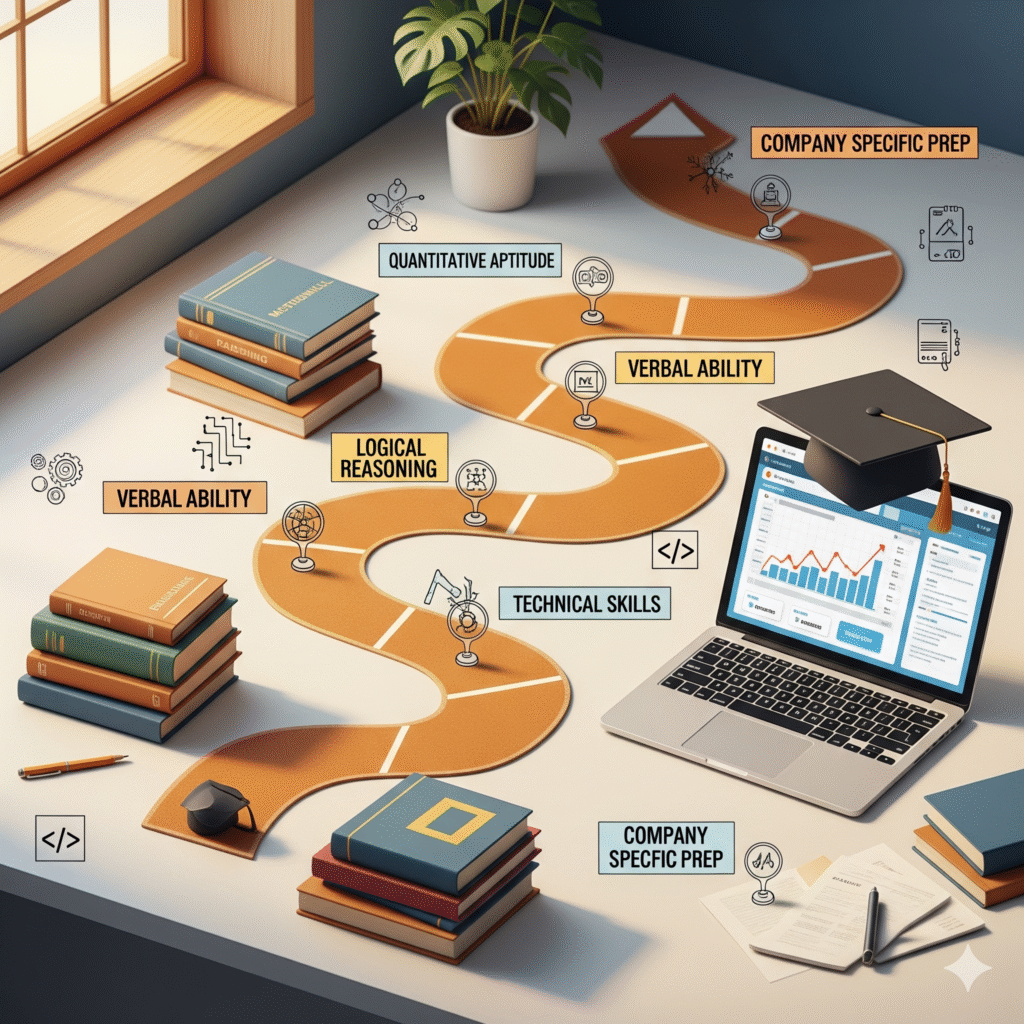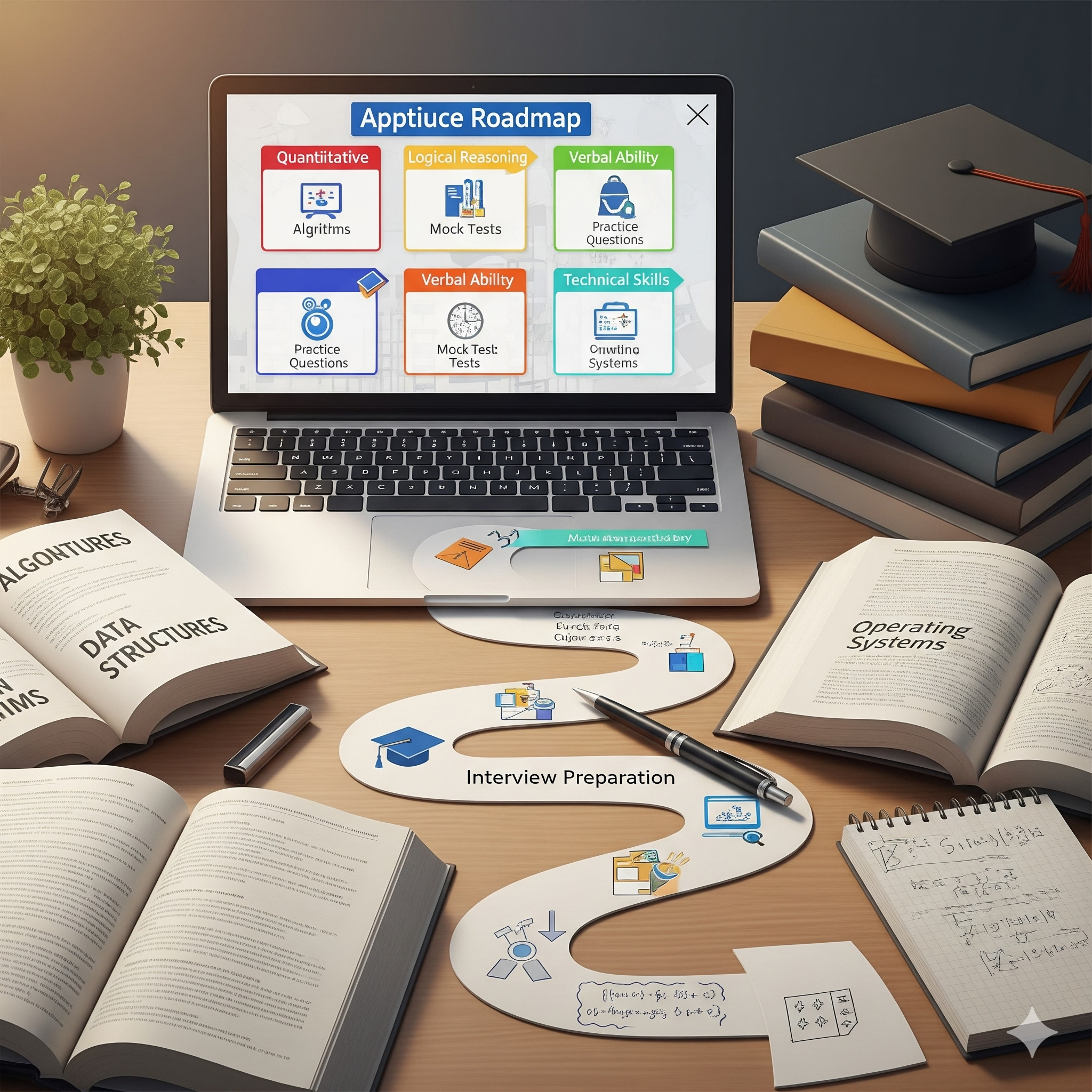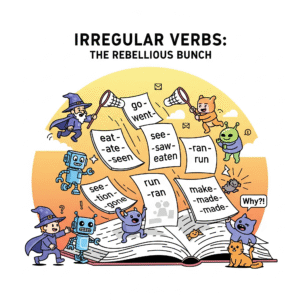Table of Contents
Aptitude Roadmap for Placement Preparation: Complete Guide for Engineering Students
If you are a final-year engineering student preparing for placements, you already know how important aptitude tests are. Aptitude is usually the first round of any recruitment process, and clearing it is mandatory to even reach technical and HR interviews. Sadly, many students take this section lightly and end up losing opportunities.
That’s why having a clear aptitude roadmap for placement preparation is a game-changer. In this blog, I’ll walk you through a step-by-step, detailed roadmap covering quantitative aptitude, logical reasoning, verbal ability, and placement-specific add-ons. This is designed especially for engineering students (CSE, IT, ECE, Mechanical, etc.) who are targeting companies like TCS, Infosys, Wipro, Accenture, Capgemini, and product-based companies.
Why Aptitude Matters in Placements?
Companies use aptitude tests to filter out candidates quickly. These tests evaluate your:
- Problem-solving skills
- Logical thinking ability
- Time management
- English communication skills
Even if you are strong in coding or technical subjects, a poor aptitude score can stop you at the very first stage. That’s why mastering aptitude is non-negotiable.
The Aptitude Roadmap for Placement Preparation

Here’s the complete roadmap divided into phases and topics, so you can systematically prepare.
Phase 1: Build Your Foundation
Before diving into tricky problems, you need speed and accuracy in basic calculations.
- Learn speed math techniques: quick multiplication, Vedic math tricks
- Practice squares, cubes, square roots, cube roots
- Revise percentages, ratios, and fractions
- Work on approximation & simplification problems
This phase ensures that you don’t waste time on basic arithmetic during exams.
Phase 2: Master Quantitative Aptitude
This is the heart of placement tests. Companies heavily focus on Quant topics.
- Number System
- HCF & LCM, divisibility rules, factors & multiples
- Remainders, modular arithmetic, units digit, last digit
- Percentages, Ratios, and Averages
- Percentage increase/decrease
- Successive percentage changes
- Weighted averages
- Profit, Loss, and Discounts
- Marked price, selling price, cost price
- Successive discounts
- Simple and Compound Interest
- SI vs CI comparisons
- Growth/decay type questions
- Time, Speed & Distance
- Relative speed problems
- Trains, boats & streams, races
- Time & Work
- Work efficiency
- Pipes and cisterns
- Algebra
- Linear & quadratic equations
- Inequalities and simplifications
- Permutation, Combination & Probability
- Counting principles
- Arrangements & selections
- Probability basics (with real-life examples)
- Geometry & Mensuration
- Triangles, circles, polygons
- 2D area & perimeter, 3D volumes and surface area
- Data Interpretation (DI)
- Tables, bar graphs, pie charts
- Line graphs, caselets, missing DI
Phase 3: Logical Reasoning & Analytical Ability
Reasoning tests your logical thinking and problem-solving ability.
- Series (number, letter, mixed)
- Coding-Decoding (letter, number, symbol)
- Blood Relations & Family Trees
- Directions & Distance Problems
- Seating Arrangements (linear, circular, rectangular)
- Puzzles (floor, scheduling, box arrangement)
- Syllogisms & Venn Diagrams
- Inequalities (direct and coded)
- Input-Output Problems (machine operations)
- Critical Reasoning (assumptions, arguments, cause-effect, conclusions)
Phase 4: Verbal Ability (English Skills)
English is not just for aptitude tests but also for group discussions, email writing, and interviews.
- Grammar Basics
- Subject-verb agreement
- Tenses, articles, prepositions
- Error spotting
- Vocabulary
- Synonyms, antonyms
- Idioms & phrases
- One-word substitution
- Reading Comprehension (RC)
- Inference-based questions
- Fact vs opinion
- Passage summaries
- Sentence Completion & Correction
- Fill in the blanks
- Sentence improvement
- Para-Jumbles & Cloze Tests
- Rearranging sentences logically
- Choosing context-appropriate words
Phase 5: Placement-Specific Add-Ons
For engineering students, especially CSE/IT:
- Pseudo-code and logical programming
- Basic DSA (arrays, strings, recursion, trees, graphs)
- DBMS (SQL queries, joins, normalization)
- Operating System (deadlocks, scheduling, memory management)
- Computer Networks (protocols, OSI, IP basics)
- OOPs Concepts (inheritance, polymorphism, encapsulation, abstraction)
Even if aptitude clears the first round, these topics decide your technical interview success.
Phase 6: Revision and Mock Tests
- Practice 20–30 aptitude problems daily
- Take weekly mock tests to simulate exam pressure
- Maintain an error log of mistakes and weak areas
- Focus on time management: solve each question within 60–90 seconds
Optional but Useful Topics
Some companies occasionally include these:
- Mixtures & Alligation
- Logarithms, Surds & Indices
- Clocks & Calendars
- Set Theory & Venn Diagrams
- Bayes’ Theorem (advanced probability)
Not all companies ask them, but knowing them gives you an extra edge.
Final Words
An aptitude roadmap for placement preparation is not just about solving questions—it’s about building the right mindset, practicing smart, and mastering time management.
If you’re consistent, you can cover the entire syllabus in 2–3 months with daily practice and mocks. Remember: aptitude is the gateway to your dream job, and once you clear it, you’ll confidently face technical and HR rounds.
So, start today, follow this roadmap step by step, and stay disciplined. Your placement success is just a matter of preparation + practice!
Useful Resources for Aptitude Preparation
To make your aptitude roadmap for placement preparation more effective, here are some helpful resources:
Internal Links
- Aptitude Tricks for Beginners – Learn speed math, Vedic tricks, and easy shortcuts to save time in aptitude exams.
- First Java Program – Step-by-step guide to writing and running your very first Java code. Perfect for coding round preparation.
- IntelliJ IDEA Installation Guide – A complete setup tutorial for IntelliJ, widely used in competitive coding and development.
- Install Eclipse IDE for Java – Beginner-friendly walkthrough to install and configure Eclipse IDE for Java projects.
- Object-Oriented Programming in Java – Master OOP concepts like inheritance, polymorphism, encapsulation, and abstraction with practical Java examples.
- Install VS Code for Java – Learn how to install and configure VS Code for Java development, helpful for both projects and interviews.
External Links
- GeeksforGeeks aptitude practice – detailed topic-wise aptitude problems.
- Aptitude questions with explanations on IndiaBIX – one of the most used sites for placements.





Pingback: Blood Relations Aptitude: Tricks, Family Tree Diagrams, and Placement Questions - Monika's Study Space
Pingback: HP Power Lab 2.0 – Hindustan Petroleum Case Study Challenge | ₹5.75 Lakh Prizes | Unstop Opportunity - Monika's Study Space